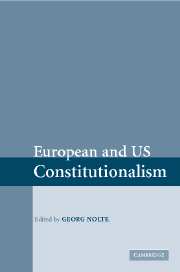Book contents
- Frontmatter
- Contents
- Preface
- PART I Introduction
- PART II Freedom of speech
- PART III Human dignity
- 4 The concept of human dignity in European and US constitutionalism
- 5 ‘Human dignity’ in Europe and the United States: the social foundations
- Comment
- Comment
- PART IV The protective function
- PART V Adjudication
- PART VI Democracy and international influences
- Index
4 - The concept of human dignity in European and US constitutionalism
from PART III - Human dignity
Published online by Cambridge University Press: 13 August 2009
- Frontmatter
- Contents
- Preface
- PART I Introduction
- PART II Freedom of speech
- PART III Human dignity
- 4 The concept of human dignity in European and US constitutionalism
- 5 ‘Human dignity’ in Europe and the United States: the social foundations
- Comment
- Comment
- PART IV The protective function
- PART V Adjudication
- PART VI Democracy and international influences
- Index
Summary
Models of constitutionalism
In order to assess the role played by the concept of human dignity in European and US constitutionalism, it is expedient to briefly recall the two phases that western constitutionalism went through during the last two centuries.
In the nineteenth century, the state model prevailing on both sides of the Atlantic was the classical liberal model. The legal system was composed of relatively few stable norms, some of which were modified from time to time by special legislation. The special norms were meant to be interpreted narrowly. The system would define and protect the autonomy of the individual in all areas of social life, in particular the economy, culture and politics. Where formal, written constitutions existed, they usually contained solemn guarantees for individual autonomy, the fundamental institutes of which were already defined and protected by sub-constitutional, ordinary law. In addition, these constitutions usually proclaimed a general principle of formal equality of all citizens before the law. The constitutional guarantees were judicially enforceable against executive state action. In the United States they were, in principle, also enforceable against unconstitutional legislation.
The twentieth century witnessed the advent and the expansion of the model of the interventionist state. The progress of the new model was primarily connected with the industrialisation of society. Industrialisation carried with it:
a weakening of autonomy rights in the area of economic relationships in order to protect important interests which were not sufficiently provided for by the mechanisms of the free market;
a reinforcement of civil rights and freedoms in the areas of culture, politics and the strictly personal life of the individual, perhaps as a sort of compensation for the diminished force of economic freedoms;
[…]
- Type
- Chapter
- Information
- European and US Constitutionalism , pp. 85 - 107Publisher: Cambridge University PressPrint publication year: 2005
- 16
- Cited by



